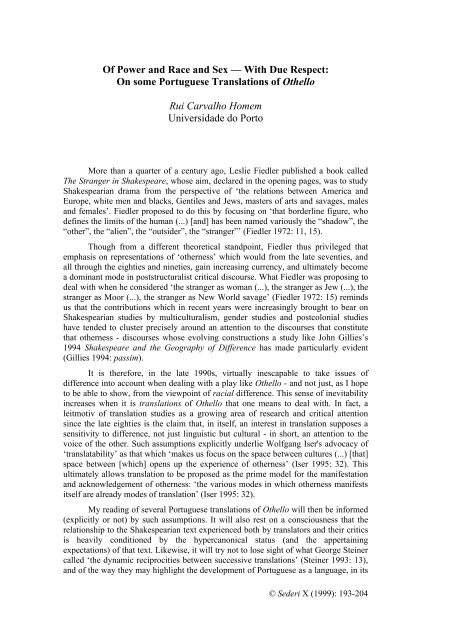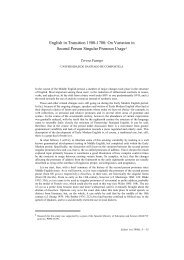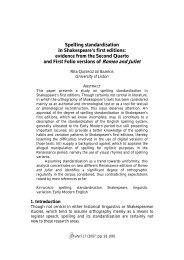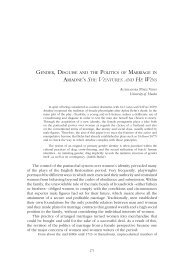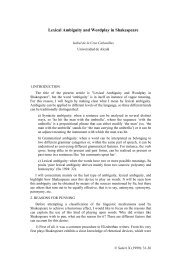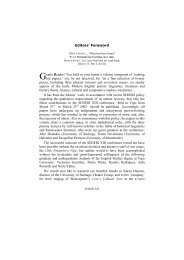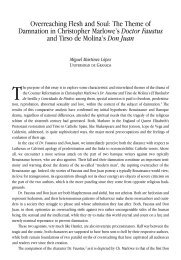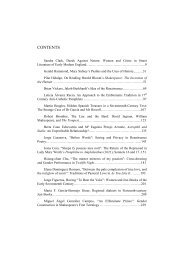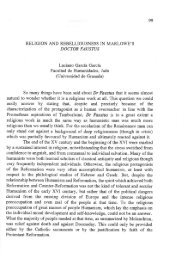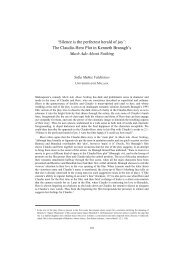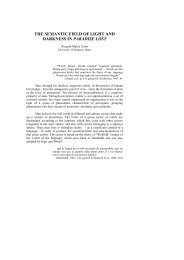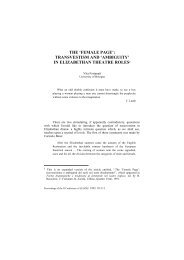On some Portuguese Translations of Othello Rui Carvalho ... - SEDERI
On some Portuguese Translations of Othello Rui Carvalho ... - SEDERI
On some Portuguese Translations of Othello Rui Carvalho ... - SEDERI
Create successful ePaper yourself
Turn your PDF publications into a flip-book with our unique Google optimized e-Paper software.
Of Power and Race and Sex — With Due Respect:<br />
<strong>On</strong> <strong>some</strong> <strong>Portuguese</strong> <strong>Translations</strong> <strong>of</strong> <strong>Othello</strong><br />
<strong>Rui</strong> <strong>Carvalho</strong> Homem<br />
Universidade do Porto<br />
More than a quarter <strong>of</strong> a century ago, Leslie Fiedler published a book called<br />
The Stranger in Shakespeare, whose aim, declared in the opening pages, was to study<br />
Shakespearian drama from the perspective <strong>of</strong> ‘the relations between America and<br />
Europe, white men and blacks, Gentiles and Jews, masters <strong>of</strong> arts and savages, males<br />
and females’. Fiedler proposed to do this by focusing on ‘that borderline figure, who<br />
defines the limits <strong>of</strong> the human (...) [and] has been named variously the “shadow”, the<br />
“other”, the “alien”, the “outsider”, the “stranger”’ (Fiedler 1972: 11, 15).<br />
Though from a different theoretical standpoint, Fiedler thus privileged that<br />
emphasis on representations <strong>of</strong> ‘otherness’ which would from the late seventies, and<br />
all through the eighties and nineties, gain increasing currency, and ultimately become<br />
a dominant mode in poststructuralist critical discourse. What Fiedler was proposing to<br />
deal with when he considered ‘the stranger as woman (...), the stranger as Jew (...), the<br />
stranger as Moor (...), the stranger as New World savage’ (Fiedler 1972: 15) reminds<br />
us that the contributions which in recent years were increasingly brought to bear on<br />
Shakespearian studies by multiculturalism, gender studies and postcolonial studies<br />
have tended to cluster precisely around an attention to the discourses that constitute<br />
that otherness - discourses whose evolving constructions a study like John Gillies’s<br />
1994 Shakespeare and the Geography <strong>of</strong> Difference has made particularly evident<br />
(Gillies 1994: passim).<br />
It is therefore, in the late 1990s, virtually inescapable to take issues <strong>of</strong><br />
difference into account when dealing with a play like <strong>Othello</strong> - and not just, as I hope<br />
to be able to show, from the viewpoint <strong>of</strong> racial difference. This sense <strong>of</strong> inevitability<br />
increases when it is translations <strong>of</strong> <strong>Othello</strong> that one means to deal with. In fact, a<br />
leitmotiv <strong>of</strong> translation studies as a growing area <strong>of</strong> research and critical attention<br />
since the late eighties is the claim that, in itself, an interest in translation supposes a<br />
sensitivity to difference, not just linguistic but cultural - in short, an attention to the<br />
voice <strong>of</strong> the other. Such assumptions explicitly underlie Wolfgang Iser's advocacy <strong>of</strong><br />
‘translatability’ as that which ‘makes us focus on the space between cultures (...) [that]<br />
space between [which] opens up the experience <strong>of</strong> otherness’ (Iser 1995: 32). This<br />
ultimately allows translation to be proposed as the prime model for the manifestation<br />
and acknowledgement <strong>of</strong> otherness: ‘the various modes in which otherness manifests<br />
itself are already modes <strong>of</strong> translation’ (Iser 1995: 32).<br />
My reading <strong>of</strong> several <strong>Portuguese</strong> translations <strong>of</strong> <strong>Othello</strong> will then be informed<br />
(explicitly or not) by such assumptions. It will also rest on a consciousness that the<br />
relationship to the Shakespearian text experienced both by translators and their critics<br />
is heavily conditioned by the hypercanonical status (and the appertaining<br />
expectations) <strong>of</strong> that text. Likewise, it will try not to lose sight <strong>of</strong> what George Steiner<br />
called ‘the dynamic reciprocities between successive translations’ (Steiner 1993: 13),<br />
and <strong>of</strong> the way they may highlight the development <strong>of</strong> <strong>Portuguese</strong> as a language, in its<br />
© Sederi X (1999): 193-204
RUI CARVALHO 194<br />
social and literary uses - even though the chronological range <strong>of</strong> the translations in<br />
question is <strong>of</strong> less than a century.<br />
In fact, the oldest translation I will be considering was published by José<br />
António de Freitas in 1882, and the most recent by R. Correia (identified as<br />
responsible for revising the version in question, whose author is not indicated) in<br />
1976. The others will be those by King Luiz I (1885), Domingos Ramos (1911),<br />
Frederico Montenegro (1966), and an undated translation by António Leitão de<br />
Figueiredo (probably published, from <strong>some</strong> indications to be found in its critical<br />
apparatus, between 1964 and 1966). These are the published translations which so far<br />
I could trace. In his introduction to the 1956 edition <strong>of</strong> King Luiz’s translation, Jorge<br />
Faria indicates that the oldest full translation into <strong>Portuguese</strong> <strong>of</strong> a Shakespearian text<br />
was Simão de Melo Brandão’s version <strong>of</strong> <strong>Othello</strong>, probably written in the final years<br />
<strong>of</strong> the eighteenth century - a text which, however, was left in manuscript. Faria (who<br />
indicates he had it in his private collection) endorses Brandão’s claim to have<br />
translated the play directly from English, and not, as <strong>of</strong>ten would happen, from a<br />
French version (a claim recently disproved by Maria João da Rocha Afonso (Afonso<br />
1993: passim); but he describes it as a rather free as well as ‘colourless’ version. Still<br />
according to Faria, between that date and the latter nineteenth century, <strong>some</strong><br />
imitations and adaptations were published - usually, from French versions. However,<br />
and even while I believe that a distinction between translations ‘proper’ and (e.g.)<br />
‘adaptations’ cannot be simplistically endorsed, in this paper I will restrict myself, for<br />
practical reasons, to texts which present themselves as translations and unquestionably<br />
fall within a conventional understanding <strong>of</strong> a translation. As to twentieth-century<br />
translations other than those already mentioned, I surmise there will have been <strong>some</strong><br />
other versions written for specific productions <strong>of</strong> the play - but they will not have been<br />
published.<br />
As a final remark within these preliminary considerations, it should also be<br />
said that the absence, in most <strong>of</strong> these translations, <strong>of</strong> a clear indication <strong>of</strong> the<br />
edition(s) used as sources at times complicates an understanding <strong>of</strong> the translator’s<br />
options - in passages in which, say, the 1622 Quarto and the 1623 Folio read<br />
differently (this being particularly relevant in a play for which most modern editors<br />
rely at different points on one or the other <strong>of</strong> those two source texts). The exception is<br />
Figueiredo, responsible for the only <strong>Portuguese</strong> edition we would today acknowledge<br />
as ‘scholarly’ - with a careful critical apparatus, unquestionable evidence <strong>of</strong><br />
familiarity with the seventeenth-century sources, and a clear indication <strong>of</strong> the edition<br />
(Dover Wilson’s) on which it is based. Chronologically, the first which seemed to<br />
come closer to this was Ramos’s: but, although its title page informs the reader that<br />
<strong>Othello</strong> was ‘printed for the first time in 1622', and a careful reading both <strong>of</strong> the text<br />
and the notes shows that Ramos opts for the Quarto and the Folio at different times,<br />
the criteria for that are never explained. The critical apparatus (introduction and notes)<br />
<strong>of</strong> his translation can, however, be baffling - since a show <strong>of</strong> English scholarship<br />
coexists with (for example) giving the name James I in its French version (‘Jacques I’)<br />
(Ramos 1911: 231, n17). Such a detail seems to suggest that <strong>some</strong> <strong>of</strong> that scholarship<br />
will come to the translator second hand: after all, he calls his notes ‘Commentarios do<br />
traductor colligidos de notaveis commentadores’(‘The translator’s commentary<br />
compiled from notable commentators’) (Ramos 1911: 225).<br />
Let me, however, return to my initial acknowledgement <strong>of</strong> reading assumptions<br />
largely defined by otherness, in order to take on its most obvious dimension: that <strong>of</strong><br />
<strong>Othello</strong>’s blackness. The ethics (in which I share) which would more usually<br />
© Sederi X (1999): 193-204
RUI CARVALHO 195<br />
determine a consideration <strong>of</strong> race in the humanities today would probably prepare the<br />
late twentieth-century academic reader to discover in these texts the signs <strong>of</strong><br />
anguished translators’ decisions when dealing with racially charged language. That<br />
expectation, however, is largely frustrated by the translations in question. <strong>On</strong>e could<br />
hypothesise that what seems to be a general s<strong>of</strong>tening <strong>of</strong> the play’s verbal violence in<br />
Correia’s 1976 translation might grow out <strong>of</strong> that unease - but it is, in fact, more<br />
noticeable in areas <strong>of</strong> discourse other than that <strong>of</strong> racial abuse, and the text <strong>of</strong>ten<br />
provides (rather unexpectedly) instances <strong>of</strong> the opposite. Likewise, the violence <strong>of</strong> the<br />
slurs on <strong>Othello</strong> as rendered in <strong>some</strong> passages <strong>of</strong> Montenegro’s 1966 translation might<br />
be understood, by its sheer excess, to serve at times a purpose <strong>of</strong> self-denunciation<br />
(i.e., racist language working against itself) - but it hardly exhibits a coherence <strong>of</strong><br />
purpose and attitude that would allow this hypothesis to be made into a more<br />
confident judgement. As for Figueiredo’s, its predominantly learned and at times<br />
rather ponderous tone can have an archaising effect which <strong>some</strong>how makes it more<br />
difficult for the reader to bear in mind that it is a late twentieth-century text, with all<br />
the implications <strong>of</strong> that.<br />
All in all, even in translations which are otherwise (as I will show) rather<br />
obviously bowdlerised, there are no evident signs that the translators will have<br />
experienced serious qualms when dealing with, in particular, Iago’s, Brabantio’s and<br />
Roderigo’s racial insults. Somewhat disturbingly, there seems at times to be, on the<br />
contrary, a certain amount <strong>of</strong> overtranslation <strong>of</strong> such slurs - in particular by<br />
interpretative paraphrases. In Correia, for instance, Brabantio’s words in I.2:70-1, ‘the<br />
sooty bosom / Of such a thing as thou’, is rendered as ‘um repugnante monstro como<br />
tu’ (‘a repugnant monster like you’ - Correia 1976: 88): the reference to skin colour as<br />
a specific source for Desdemona’s imagined recoiling from the African is omitted, but<br />
Correia’s version, in its choice <strong>of</strong> adjective and noun, actually verbalises racial hatred<br />
in a much more explicit (though rhetorically less effective) way. Almost a century<br />
earlier, Freitas had translated the same passage as ‘o seio tisnado e asqueroso de um<br />
ente como tu’ (‘the tanned and repellent bosom <strong>of</strong> a being like you’) (Freitas 1882:<br />
18). The translator apparently felt that the negative connotation <strong>of</strong> ‘sooty’ required<br />
additional qualification, the consequence being a more vehement manifestation <strong>of</strong><br />
racial disgust - even though the substitution <strong>of</strong> ‘ente’ (‘being’) for ‘thing’ (which all<br />
the other translators also performed) might be construed as an unintentional<br />
compensation. An instance <strong>of</strong> the translator being carried away by the rhetoric <strong>of</strong><br />
racial derision is, on the other hand, provided by Ramos, when he renders the passage<br />
in which Iago foresees that <strong>Othello</strong> will ‘tenderly be led by th’nose’ (I.3:395) as<br />
‘deixar-se levar pela beiça’ (Ramos 1911: 13). ‘Beiça’ is a mildly derogatory<br />
<strong>Portuguese</strong> term for ‘lip’, whose use means that Ramos had in mind <strong>Othello</strong>’s African<br />
features, previously mentioned in the play when Roderigo refers to ‘the thick-lips’<br />
(I.1:67), duly rendered by Ramos as ‘esse beiçudo’ (Ramos 1911: 4) - a slur he<br />
decides to add, with undisguised gusto, to Iago’s closing soliloquy in Act I.<br />
By doing this, Ramos only confirms those racial stereotypes which his<br />
Introduction postulates and expands on as fully justifying <strong>Othello</strong>’s characterisation,<br />
as well vindicating the ‘truth to life’ <strong>of</strong> the behaviour Shakespeare created for his<br />
character:<br />
Quaes as raças mais aptas para cederem ao ciume e resentirem-se de todos os<br />
seus s<strong>of</strong>frimentos? A experiencia historica ensina-nos que são todas as raças<br />
africanas, porque, educadas na liberdade absoluta do deserto e da tenda, são<br />
incapazes de comprehender estas incessantes transacções, estas prudentes<br />
© Sederi X (1999): 193-204
RUI CARVALHO 196<br />
considerações e esta discreta tolerancia que o manejo infinito das paixões<br />
reciprocas e incessantemente renascentes ensina aos homens das nossas<br />
sociedades, porque para ellas a felicidade é o orgulho da alma; o orgulho não<br />
tem pleno desenvolvimento, senão pela segurança e confiança e o amor<br />
trahido, destruindo a segurança, arruina ao mesmo tempo toda a possibilidade<br />
da vida feliz. (Ramos 1911: XIV-XV)<br />
(Which are the races more apt to yield to jealousy and resent all their<br />
sufferings? Historical experience tells us that it is all the African races,<br />
because, raised in the absolute freedom <strong>of</strong> the desert and the tent, they are<br />
incapable <strong>of</strong> understanding those incessant transactions, those prudent<br />
considerations and that discreet tolerance which the infinite handling <strong>of</strong><br />
reciprocal and incessantly reborn passions teaches the men <strong>of</strong> our societies;<br />
because for them happiness lies in the pride <strong>of</strong> their soul; pride cannot fully<br />
develop, but through security and trust; and betrayed love, by destroying<br />
security, at the same time ruins all possibility <strong>of</strong> a happy life)<br />
Further down, Ramos will add a reference to ‘[o] quente enthusiasmo da sua raça’<br />
(‘the hot enthusiasm <strong>of</strong> their race’).<br />
This tendency to believe that the ‘truth’ <strong>of</strong> Shakespeare’s dramatic character<br />
lay a lot in its ‘typical’ portrayal <strong>of</strong> an ethnic or racial type, and not ‘simply’ in the<br />
convincing representation <strong>of</strong> an individuality, was also to be found in Freitas’s<br />
Introduction, three decades earlier. But in this case the translator/commentator refuses<br />
to accept <strong>Othello</strong>’s blackness; following such an authority as Coleridge, Freitas<br />
endorses the view that, rather than being a black man, <strong>Othello</strong> (largely discussed as a<br />
historical character) would have had the complexion <strong>of</strong> an Arab. Therefore, while<br />
rooting (as Ramos would do) the character’s susceptibility to Iago’s plot in the<br />
supposed mindscape <strong>of</strong> his race, Freitas construes that frame <strong>of</strong> mind as dreamily and<br />
superstitiously ‘oriental’, rather than passionately and hotbloodedly ‘Negro’ - and he<br />
thus expands repeatedly on the ‘oriental’'s tendency to credit dreams, and on the<br />
‘impressionable nature <strong>of</strong> his race’ (Freitas 1882: XXXVII-VIII, XLVIII, LXX).<br />
Freitas’s remarks are, in fact, signal instances <strong>of</strong> that mental construction <strong>of</strong> the Orient<br />
which Edward Said has identified as ‘one <strong>of</strong> its [Europe’s] deepest and most recurring<br />
images <strong>of</strong> the Other’, a construction which ‘has helped to define Europe (or the West)<br />
as its contrasting image, idea, personality, experience’ (Said 1978: 1) - the other as<br />
‘oriental’ defining himself, as Said also demonstrates, by irrationality, imprecision,<br />
lust, and an intense concern with (dis-)honour and revenge (Said 1978: passim). It<br />
should, however, be pointed out that Freitas’s choices as a translator do not<br />
significantly further the view <strong>of</strong> <strong>Othello</strong> argued in his Introduction - to the extent that<br />
his translation, which in other respects tries to circumvent aspects <strong>of</strong> Shakespeare’s<br />
text felt to be at odds with the translator’s mores, does not in fact evade the explicit<br />
allusions to <strong>Othello</strong>’s negritude, <strong>of</strong> which Roderigo’s already quoted execration <strong>of</strong><br />
‘the thick-lips’ (‘aquelle beiçudo’ - Freitas 1882: 6) is maybe the most signal instance.<br />
Another aspect <strong>of</strong> Freitas’s remarks on <strong>Othello</strong> as ‘oriental’ will, however,<br />
have clearer implications for the connection between the Introduction and the<br />
translated text, as well as for the way the latter relates to the source text - and those are<br />
the remarks which fuse race, sex and gender. Freitas comments on the way in which<br />
understanding <strong>Othello</strong> as an Arab rather than a black man makes his marriage to<br />
Desdemona, rather than an unequal union, ‘a sympathica fusão dos dois typos<br />
primordiaes da belleza humana - o typo semitico e o typo caucasico’ (Freitas 1882:<br />
© Sederi X (1999): 193-204
RUI CARVALHO 197<br />
XXXVIII) (‘the sympathetic fusion <strong>of</strong> the two primordial types <strong>of</strong> human beauty - the<br />
Semitic and the Caucasian’). And he adds:<br />
Se <strong>Othello</strong> fosse effectivamente um negro, e, como pretendem alguns criticos,<br />
um barbaro, um selvagem, uma natureza domesticada só na apparencia, por<br />
certo não inspiraria á patricia veneziana outro sentimento alem da admiração<br />
pela sua historia. O contrario revelaria um gosto depravado, que o poeta por<br />
nenhuma fórma lhe quiz attribuir. (Freitas 1882: XXXVIII-IX).<br />
(Were <strong>Othello</strong> really a Negro, and, <strong>some</strong> critics defend, a barbarian, a savage, a<br />
nature tamed only in appearance, he surely would not inspire the Venetian<br />
aristocrat any sentiment other than admiration for his life story. Otherwise, it<br />
would reveal a depraved taste, which the poet in no way wished to ascribe to<br />
her.)<br />
This passage in fact signals the translator’s racially tainted defence <strong>of</strong> the<br />
protagonist’s conditions to be admired and loved, from which issues an equivocal<br />
defence <strong>of</strong> Desdemona: by stating that, were Desdemona to have fallen in love with an<br />
African, she would be depraved, Freitas is authorising the point <strong>of</strong> view <strong>of</strong> Iago,<br />
Roderigo and Brabantio - the characters who voice that notion in the play, but are in<br />
fact deprived by the dramatist (through characterisation) <strong>of</strong> the moral and dramatic<br />
authority to make their views acceptable to the audience. The full extent <strong>of</strong> Freitas’s<br />
positions on race and gender is in fact to be found in the today ethically most<br />
appalling passage <strong>of</strong> his Introduction - his defence <strong>of</strong> any husband’s right to murder an<br />
adulterous wife, and, concomitantly, <strong>of</strong> <strong>Othello</strong>’s ‘justness’:<br />
o adulterio é um crime, que contém em si todos os crimes, diz Proudhon. E<br />
sabemos que todos os codigos, em todos os paizes, castigam com penas suaves<br />
e até absolvem o marido, que matar a esposa adultera, quando o adulterio for<br />
uma evidencia.<br />
Que é isto senão o reconhecimento de um direito que tem o marido ultrajado de<br />
fazer justiça por suas mãos? Foi isso, e nada mais, o que praticou o Mouro de<br />
Veneza.<br />
O modo, como assassina a mulher, prova que <strong>Othello</strong> não é um faccinora, um<br />
malvado que se delicía com o s<strong>of</strong>frimento da victima. (...)<br />
Matou-a porque julgou que era justo. (Freitas 1882: LXXII-III)<br />
(adultery is a crime which contains in itself all crimes, says Proudhon. And we<br />
know that all legal codes, in all countries, punish lightly or even absolve the<br />
husband who kills an adulterous wife, when adultery is evident.<br />
What is this but the acknowledgment <strong>of</strong> a right the outraged husband has to<br />
take justice in his own hands? It was that, and no more, that the Moor <strong>of</strong><br />
Venice effected.<br />
The way in which he murders his wife proves that <strong>Othello</strong> is not a butcher, a<br />
scoundrel who takes delight in the suffering <strong>of</strong> his victim. (...)<br />
He killed her because he thought it was just;)<br />
© Sederi X (1999): 193-204
RUI CARVALHO 198<br />
It is a passage made despicable by its ethics, even when taken in its 19thcentury<br />
context (a context which does not make it ‘normal’ - we should remember<br />
how A.W.Schlegel had decried, precisely in a passage on <strong>Othello</strong>, ‘the disgraceful<br />
confinement <strong>of</strong> women and many other unnatural usages’; whilst Coleridge had<br />
pointed out that ‘surely it ought to be considered a very exalted compliment to<br />
women, that all the sarcasms on them in Shakspeare are put in the mouths <strong>of</strong> villains’<br />
- Bate 1992: 479-85). But the passage is also degraded by its lack <strong>of</strong> critical sense,<br />
which in fact spoils the moral and emotional complexity <strong>of</strong> the tragic design by<br />
demoting a ‘larger-than-life’ tragic protagonist to the status <strong>of</strong> an outraged bourgeois<br />
husband. With Freitas, it is as if the translator’s imagined male bonding with the<br />
romanticised ‘oriental’ overcame the latter’s otherness - a quality reserved, implicitly,<br />
for the woman, with whom no such solidarity is experienced.<br />
The construction <strong>of</strong> woman as stranger (to retrieve Leslie Fiedler’s<br />
formulation) can also be seen in Ramos’s Introduction - which goes one step further<br />
than Freitas by partly inculpating Desdemona for her lot, while only being able to<br />
understand her love for the African as a self-punishing whim:<br />
O valor, a virtude, os longos s<strong>of</strong>frimentos d’<strong>Othello</strong> cegaram-na; não viu as<br />
differenças dseagradaveis que o separavam d’ella, <strong>of</strong>fereceu-se amorosamente<br />
ao velho soldado como vitima expiatoria da sua laboriosa vida, como<br />
holocausto encarregado de resgatar as suas duras fadigas. Offereceu-se como<br />
holocausto! Não haverá n’isto um vislumbre de perversidade? Os anjos<br />
tambem pódem ter a sua maldadesinha; é um excesso de zelo seraphico, um<br />
exaggero vivissimo d’humildade, uma expansão de caridade ardentissima.<br />
(Ramos 1911: XVI-XVII)<br />
(Valour, virtue, <strong>Othello</strong>’s long sufferings blinded her; she did not see the<br />
unpleasant differences which separated him from her, and she <strong>of</strong>fered herself<br />
amorously to the old soldier as a scapegoat for his arduous life, as a holocaust<br />
that would redress his severe hardships. She <strong>of</strong>fered herself as a holocaust! Is<br />
there not in this a glimpse <strong>of</strong> perversity? Angels can also have their little evil; it<br />
is an excess <strong>of</strong> seraphic zeal, a vivid exaggeration <strong>of</strong> humility, an expanse <strong>of</strong><br />
the most ardent charity.)<br />
But if this passage might suggest an individual bent, the exceptional and the<br />
unique, Ramos will promptly turn it into a generic judgement - a gender-determined<br />
judgement, which is half condescension and half indictment:<br />
Mas esta angelica malvadez, que é a da esposa d’<strong>Othello</strong>, é muito feminina.<br />
Shakespeare, que comprehendeu o coração humano em toda a sua extensão,<br />
viu n’este amoroso ardor de sacrificio o elemento primario d’um dos typos<br />
mais attrahentes, patheticos e mais altivamente feminis que jámais algum poeta<br />
creou. (Ramos 1911: XVII)<br />
(But this angelic fiendishness, which is that <strong>of</strong> <strong>Othello</strong>’s wife, is very<br />
feminine. Shakespeare, who understood the human heart in its full extension,<br />
saw in this amorous ardour for sacrifice the primary element <strong>of</strong> one <strong>of</strong> the most<br />
attractive, pathetic and more proudly feminine types which any poet ever<br />
created)<br />
© Sederi X (1999): 193-204
RUI CARVALHO 199<br />
Behind this understanding <strong>of</strong> the character lies an inability to accept as<br />
‘normal’ a woman’s passion that is as vocal and daring as Desdemona’s is in Act I, in<br />
the face <strong>of</strong> an exclusively male public power: the response is to see the virtuous but<br />
assuming woman as that mixture <strong>of</strong> saint and whore which haunts Ramos’s comments<br />
- and it will be my contention that the bowdlerisations patent in the translations<br />
analysed owe a lot to the perplexities and the fears which that originates. Of those<br />
fears, the one which more <strong>of</strong>ten recurs explicitly throughout <strong>Othello</strong> is that <strong>of</strong><br />
cuckoldry - a fate which, in <strong>Portuguese</strong> as in other southern European languages and<br />
cultures, inevitably conjures that image <strong>of</strong> the cuckold’s horns which is also present in<br />
the text <strong>of</strong> <strong>Othello</strong>. It may be revealing that none <strong>of</strong> the translations in question adopts<br />
a single or coherent option for translating the repeated occurrences <strong>of</strong> ‘cuckold’, and<br />
for tackling an image like ‘this forkèd plague’ or a dictum like ‘A hornèd man’s a<br />
monster and a beast’ - more <strong>of</strong>ten than not evaded through euphemisms such as ‘o<br />
homem enganado’, ‘o coitado’ (‘the deceived man’, ‘the poor man’), or decorous<br />
paraphrase like ‘aquelle que é trahido’ (‘that who is betrayed’). Even Montenegro, the<br />
first who bluntly translates ‘to cuckold’ as ‘pôr os cornos’, shies <strong>of</strong>f that option in later<br />
occurrences. In this respect, though, King Luiz I provides the most curious case <strong>of</strong> a<br />
rather erratic attitude in terms <strong>of</strong> verbal decorum. In his prologue, the royal translator<br />
explicitly vows to be true to the bluntness <strong>of</strong> Shakespeare’s language:<br />
entendi que seria um crime mutilar esta tragédia por mal cabido pudor,<br />
deixando de traduzir frases que, embora rudes, não me julguei autorizado a<br />
eliminar. (...) como tradutor, devo estar isento, para o público, da<br />
responsabilidade da linguagem, que ele por certo hoje não empregaria, mas que<br />
a fidelidade da tradução me obrigou a conservar (Luiz 1885: 17)<br />
(it was my understanding that it would be a crime to mutilate this tragedy out<br />
<strong>of</strong> undue prudery, by not translating sentences which, though rude, I did not<br />
feel entitled to eliminate. (...) as a translator, I must be exempt, before the<br />
public, from any responsibility for the language which he [Shakespeare] would<br />
surely not employ today, but which I was forced to preserve in the name <strong>of</strong> a<br />
faithful translation)<br />
When dealing with the issue <strong>of</strong> cuckoldry, these honourable intentions will be<br />
kept with passages such as ‘esta córnea praga’ (for ‘this forkèd plague’) or ‘Um<br />
homem cornudo é um monstro e uma besta’ (Luís 1885: 158) - one <strong>of</strong> the more literal<br />
renderings, within the six translations considered, <strong>of</strong> the memorably concise ‘A<br />
hornèd man’s a monster and a beast’ (IV.-1:62). But strangely baffling will be King<br />
Luiz’s solution for Emilia’s question, in IV.-3:74-5: ‘who would not make her<br />
husband a cuckold, to make him a monarch?’ - rendered by this monarch as: ‘quem<br />
não coroaria o seu marido para o fazer monarca?’ (Luiz 1885: 198) (‘who would not<br />
crown her husband to make him a monarch?’). It is true that ‘coroar’, in <strong>Portuguese</strong>,<br />
can be a popular euphemism for ‘cuckolding’, but it is most peculiar that this should<br />
have been the choice <strong>of</strong> a translator who happened to be a ‘crowned head’.<br />
Another revealing example <strong>of</strong> the translators’ embarrassment with images <strong>of</strong><br />
male sexuality under threat occurs with Iago’s (apparently invented) narration, in III.3,<br />
<strong>of</strong> Cassio’s supposedly ‘revealing’ dream: in the course <strong>of</strong> a war campaign, the two<br />
men would have shared a bed, Cassio having in his sleep taken Iago for Desdemona<br />
and made <strong>some</strong> amorous advances, vigorously hugging and kissing him - a high point<br />
<strong>of</strong> this, according to Iago, occurring when Cassio ‘laid his leg / Over my thigh, and<br />
© Sederi X (1999): 193-204
RUI CARVALHO 200<br />
sighed, and kissed’. The description is farcical, and may be exploited as such on stage,<br />
but the homosexual embrace (even if as an unwilling gesture) apparently touched a<br />
sensitive chord: in 1976, Correia plainly excised the ‘leg over thigh’ passage (Correia<br />
1976: 132), whilst Freitas had, in 1882, given us a clear-cut example <strong>of</strong> what Bakhtine<br />
would describe as the play between ‘high’ and ‘low’ images <strong>of</strong> the body (Bakhtine<br />
1970: passim) - by rendering ‘[he] laid his leg / Over my thigh’ as ‘e cingia-me o<br />
pescoço’ (Freitas 1882: 116) (‘and he clasped me by the neck’).<br />
If perplexities arise when one considers the translators’ choices for dealing<br />
with the humiliations <strong>of</strong> sexual betrayal, or <strong>of</strong> an accidental homoerotic involvement,<br />
an embarrassed attitude will also predominate when it comes to graphically describing<br />
sexual activity - in particular when the woman seems to embody the paradigm <strong>of</strong> saint<br />
rather than that <strong>of</strong> whore. Separated by almost a century, both Freitas and Correia<br />
extensively bowdlerise Iago’s obscene descriptions <strong>of</strong> <strong>Othello</strong> and Desdemona’s<br />
union in Act I, Scene I, where passages like ‘you’ll have your daughter covered with a<br />
Barbary horse’ (111-12), or ‘your daughter and the Moor are now making the beast<br />
with two backs’ (116-17) are either eliminated or made vague by Correia (Correia<br />
1976: 84ff) - and were rendered by Freitas as ‘Quereis ter por genro um cavallo da<br />
Barbaria?’ (‘would you have a Barbary horse for a son-in-law’?) and ‘vossa filha está<br />
nos braços do Mouro’ (‘your daughter is in the arms <strong>of</strong> the Moor’) (Freitas 1882: 8-<br />
10). Correia also gives us examples <strong>of</strong> a translation <strong>of</strong> precise sexual images as vague<br />
sentimental ones, in particular with two passages in Iago’s soliloquies: ‘I hate the<br />
Moor, / And it is thought abroad that ‘twixt my sheets / He’s done my <strong>of</strong>fice’ (I.3:380-<br />
2) becomes ‘Mas odeio o mouro, porque se murmura que minha mulher o ama’<br />
(Correia 1976: 98) (‘But I hate the Moor, because it is murmured that my wife loves<br />
him’); and ‘I do suspect the lusty Moor / Hath leaped into my seat’ (II.1:286-7)<br />
becomes ‘suspeito de que o mouro andou em tempos pelo meu jardim’ (Correia 1976:<br />
107) (‘I suspect the Moor once strolled in my garden’). Ten years earlier, however, the<br />
latter passage had been translated by Montenegro in a way which suffered from a<br />
directly opposite attitude: even if not in a constant and coherent way, Montenegro’s<br />
translation is at times at pains to prove how free from squeamishness it is, the result<br />
being over-explicit and gross renderings <strong>of</strong> sexual imagery. Thus, ‘I do suspect the<br />
lusty Moor / Hath leaped into my seat’ (II.1:286-7) becomes ‘desconfio bem que esse<br />
Mouro lascivo pulou de gozo na cama com a minha mulher’ (Montenegro 1966: 63)<br />
(‘I do suspect the lusty Moor has bounced with pleasure in bed with my wife’) - the<br />
over-explicitness being obvious when contrasted to Figueiredo’s more literal ‘eu<br />
suspeito que o Mouro lascivo pinchou na minha cama’ (Figueiredo n.d.: 149); and, in<br />
the same soliloquy, and even more excessively, ‘I fear Cassio with my night-cap too’<br />
is rendered as ‘receio que Cássio também me tenha montado a fêmea’ (Montenegro<br />
1966: 64) (‘I fear Cassio may have mounted my female too’) - as against Figueiredo’s<br />
‘receio bem que Cássio também já se me tenha metido na cama’ (‘I do fear Cassio<br />
may also have slipped into my bed’), a version which also discards metonymy in<br />
favour <strong>of</strong> literalness, but does not so seriously overtranslate Shakespeare’s passage.<br />
Not many lines below in Act II Montenegro will adopt the same strategy for<br />
dealing with the passage in which Iago tries to tempt the courteous Cassio into an<br />
equivalent to locker-room talk about Desdemona - one <strong>of</strong> his most daring quips being:<br />
‘And, I’ll warrant her, full <strong>of</strong> game’ (II-3:19), which Montenegro translates as ‘E<br />
aposto que se mexe bem na cama’ (Montenegro 1966: 66) (‘And I bet she moves well<br />
in bed’). This passage had, in fact, been rendered rather frankly (if we bear in mind<br />
that it concerns the difficult issue <strong>of</strong> women’s sexual enjoyment) by both Freitas and<br />
© Sederi X (1999): 193-204
RUI CARVALHO 201<br />
Ramos - respectively as ‘...doida por gosar’ (Freitas 1882: 64) and ‘E que gosta de<br />
gosar’ (Ramos 1911: 62) - as well as by Figueiredo, in terms (again) similar to but less<br />
explicit than Montenegro: ‘E aposto que há-de ser mexidinha’ (Figueiredo n.d: 150);<br />
and it would in 1976 elicit from Correia the strangely risible: ‘E tem pinta de ser<br />
alegre e saltadora como um cabrito’ (Correia 1976: 109) (‘And she has all the signs <strong>of</strong><br />
being merry and skippy as a little goat/ kid’). Of this group <strong>of</strong> translators, in fact, the<br />
one who finds it most difficult to translate references to Desdemona’s sexuality is<br />
King Luiz, who promptly forgets his initial vow <strong>of</strong> bluntness and renders the same<br />
words as ‘cheia de atractivos’ (Luiz 1885: 79) (‘full <strong>of</strong> attractions’) - this strategy<br />
entailing that the contrast between Iago’s insinuations and Cassio’s courteousness is<br />
lost. At times King Luiz will in fact translate sexually charged passages without<br />
technically bowdlerising them, but resorting to a vocabulary which will in practice<br />
prevent most <strong>of</strong> his readers from ever understanding him - as is the case with his<br />
version <strong>of</strong> Cassio’s wish that <strong>Othello</strong> may arrive safely in Cyprus and ‘Make love’s<br />
quick pants in Desdemona’s arms’ (II-1:80); the frankness <strong>of</strong> this passage is in fact<br />
retained by the other translators (to the exception <strong>of</strong> Figueiredo), whilst King Luiz<br />
decided to render it impenetrable: ‘faz (...) os crebros anélitos do amor nos braços de<br />
Desdémona’ (Luiz 1885: 65).<br />
King Luiz will not be alone, however, in not stomaching well the obscenities<br />
and insults in which the play abounds, almost all <strong>of</strong> them directed at Desdemona -<br />
both in the character’s presence and absence. The word ‘whore’ has a high number <strong>of</strong><br />
occurrences, and in the six translations it is almost never given as its corresponding<br />
<strong>Portuguese</strong> four-letter-word - ‘replaced’ rather by the more neutrally descriptive<br />
‘prostituta’ or ‘adúltera’, or by a range <strong>of</strong> socially more acceptable synonyms for the<br />
lost woman, such as ‘rameira’ or ‘desavergonhada’. The rhetorical, aesthetic and<br />
dramatic costs <strong>of</strong> such prudishness - as in this final stage I will try to prove - are high,<br />
in that they ultimately put at risk the tragic dimension <strong>of</strong> the play as constructed by its<br />
language and characterisation. At its most obvious, it turns the pathos <strong>of</strong> certain<br />
pronouncements into potentially risible assertions - as when Desdemona’s words, after<br />
being insulted: ‘I cannot say “whore”’ (IV.-2:160) are rendered by King Luiz as ‘Não<br />
posso pronunciar - prostituta’ (Luiz 1885: 187) (‘I cannot pronounce - prostitute’),<br />
which makes it sound as if the alliterative sequence is too hard for Desdemona to<br />
articulate... The rather systematic rendering (by all six translators on most occasions)<br />
<strong>of</strong> ‘whore’ as ‘prostituta’ also lays an emphasis on denotation which is, with most<br />
occurrences <strong>of</strong> the word, a lot less important than its sheer purpose <strong>of</strong> abuse and<br />
invective: when Iago, in the last scene, calls his wife Emilia (who is publicly<br />
denouncing him) a ‘villainous whore’, he is not accusing her <strong>of</strong> selling sexual favours<br />
(as, for instance, Figueiredo’s ‘Miserável prostituta!’ would suggest - Figueiredo n.d.:<br />
251) - but rather means to level at her the most violent verbal attack possible, both as<br />
retaliation and as intimidation; this purpose can only be achieved in translation with<br />
equally violent and socially punitive language, which is plainly not the case with the<br />
majority <strong>of</strong> the solutions found by these six translators.<br />
From the viewpoint <strong>of</strong> dramatic rhetoric, worse is the case, however, <strong>of</strong> those<br />
concise pronouncements which abound in the protagonist’s voice, indicting<br />
Desdemona or inveighing against Iago in a register which is characteristically that <strong>of</strong><br />
Jacobean tragedy. <strong>On</strong>e instance is <strong>Othello</strong>’s imperative: ‘Be sure thou prove I love a<br />
whore’ (III.3:356), which Correia translates as ‘Dá-me provas infalíveis de que minha<br />
esposa é adúltera’ (Correia 1976: 131) (‘Give me infallible evidence that my wife is<br />
an adulteress’) - a rendering which totally destroys the tone and the rhythm <strong>of</strong> the<br />
© Sederi X (1999): 193-204
RUI CARVALHO 202<br />
original (emphasised by its iambic regularity). An even clearer instance is <strong>Othello</strong>’s<br />
already posthumous judgement on Desdemona (before his anagnorisis) as the<br />
irretrievably lost woman: ‘She turned to folly; and she was a whore’ (V.2:133). King<br />
Luiz’s is, in this case, the best <strong>of</strong> the available options, in rhythm and concision:<br />
‘Desvairou; era uma rameira!’ (Luiz 1885: 224) (‘She went mad; she was a<br />
strumpet’). But Shakespeare’s lapidary statement is diluted, made banal, decorous and<br />
verbose in most <strong>of</strong> the other translations: ‘Tinha-se entregado ao vicio; era uma<br />
prostituta’ (Freitas 1882: 203) (‘She had given herself up to vice; she was a<br />
prostitute’); ‘Tornou-se uma maluca, uma prostituta!’ (Montenegro 1966: 207) (‘She<br />
became a foolish woman, a prostitute’) ; ‘Ela fez-se uma doida; era uma meretriz’<br />
(Figueiredo n.d.: 246) (‘She went mad; she was a courtesan’); ‘Ella portava-se mal,<br />
era uma desavergonhada, uma devassa’ (Ramos 1911: 206) (‘She misbehaved, she<br />
had no shame, she was a slut’).<br />
Of these alternatives, Ramos’s is, I believe, the worst, in that, by its lexical<br />
choices and its enumerative excess, it demotes the tragic protagonist’s utterance to the<br />
level <strong>of</strong> vulgar name-calling - even though Ramos refrains, in this passage, from<br />
literally translating ‘whore’. He is, however, the only translator to actually employ the<br />
<strong>Portuguese</strong> word ‘puta’ - equivalent to ‘whore’, but avoided in all the other<br />
translations - but he employs it only twice, in passages he will have judged more<br />
poignant. The daring <strong>of</strong> that choice, however, is only apparent, and does not mean that<br />
Ramos deals more honestly than other translators with the discourse on women in<br />
<strong>Othello</strong>. <strong>On</strong> the contrary, Ramos’s perspective on women and sexuality (already<br />
hinted at when he suggests, in his Introduction, that women are at bottom a mixture <strong>of</strong><br />
angels and devils, ultimately responsible for what befalls them) is best revealed in the<br />
gusto and zest with which he resorts to a long list <strong>of</strong> terms <strong>of</strong> abuse for lost women.<br />
To Shakespeare’s ‘whore’ and ‘strumpet’, Ramos answers with (besides the sparingly<br />
used ‘puta’) ‘marafona’, ‘debochada’, ‘perdida’, ‘pécora’, ‘porca’, ‘desavergonhada’<br />
and ‘devassa’ - all the verbal wealth the woman on the street corner might hear from<br />
pimp and bourgeois customer alike, the language <strong>of</strong> bourgeois stigmatisation, distinct<br />
from (but ultimately more prejudiced than) obscenities in their vernacular nakedness.<br />
And misogyny is what Ramos also reveals when describing the only actual prostitute<br />
in <strong>Othello</strong>, Bianca; Shakespeare’s text reads: ‘It is a creature / That dotes on Cassio’ -<br />
but Ramos translates it as: ‘Esta creatura faz andar a cabeça de Cassio á roda’ (Ramos<br />
1911: 142) (‘This creature has turned Cassio’s head’). In short, whereas Shakespeare’s<br />
Bianca suffers from an infatuation with Cassio (from whom she will get no respect<br />
and little affection), Ramos’s Bianca is charged with causing Cassio an infatuation -<br />
the lost woman ultimately responsible for almost ruining a good man. But Ramos<br />
(later followed by Figueiredo) at least translates ‘whoring’ (the male activity <strong>of</strong><br />
seeking that ruin, as referred to in Iago’s phrase ‘This is the fruit <strong>of</strong> whoring’-<br />
V.1:116) as ‘libertinagem’, which carries a negative connotation - whereas for both<br />
Freitas and King Luiz ‘whoring’ was no more than a benevolently and humorously<br />
phrased ‘vida airada’.<br />
Ramos’s options when characterising women, from his Introduction to his<br />
translation, is only the most extreme example <strong>of</strong> a practice, also exhibited by the other<br />
translators, which helps vindicate Iago’s view <strong>of</strong> women - that they are all whores.<br />
That this implication is always lurking close is made apparent by the translations <strong>of</strong><br />
<strong>Othello</strong>’s soliloquised pronouncement on Emilia: ‘This is a subtle whore’ (IV.2:20) -<br />
rendered by Freitas, Figueiredo and Correia as ‘É uma espertalhona’ (‘she’s a clever<br />
one’), ‘é uma devassa espertalhona’ (‘she’s a clever slut’), and (worst <strong>of</strong> all) ‘É<br />
© Sederi X (1999): 193-204
RUI CARVALHO 203<br />
mulher astuta’ (‘she’s a crafty woman’). As vindicated by the final roles <strong>of</strong> the women<br />
in <strong>Othello</strong>, this is a view which Shakespeare’s tragedy ultimately defeats - whilst <strong>some</strong><br />
<strong>of</strong> the options made by his <strong>Portuguese</strong> translators would seem to risk reinstating it.<br />
That can be the cost <strong>of</strong> a predominant attitude behind the translations<br />
considered which King Luiz’s prologue had made explicit - an attitude governed by<br />
the belief that, had Shakespeare written for a later, supposedly more refined age, he<br />
would have shunned those ‘improprieties’ most <strong>of</strong> these translators seem to believe it<br />
is their duty to rid him <strong>of</strong>. Their understanding <strong>of</strong> the means to achieve their purpose<br />
will entail that a strategy <strong>of</strong> ‘naturalisation’ or (as Lawrence Venuti would call it)<br />
‘domestication’ (Venuti 1995: passim) is largely employed - translating Shakespeare<br />
predominantly into the accepted language <strong>of</strong> a late nineteenth- or early twentiethcentury<br />
bourgeoisie, with its narrowly defined decorum. This (as I hope the examples<br />
given will have shown) ultimately dates the translations all the more - whilst losing<br />
tragedy the dimension <strong>of</strong> strangeness proper to its conventionally high ground, and<br />
favouring instead the sameness proper to a discourse <strong>of</strong> prejudice and small decencies.<br />
REFERENCES<br />
Primary Sources:<br />
Bragança, D.Luiz de. trans. 1885: Otelo, o Mouro de Veneza: Tragédia em cinco<br />
Actos. Repr. 1956. Porto, Lello.<br />
Correia, R. trans. 1976: Macbeth, Otelo, O Mercador de Veneza, Júlio César. Lisboa,<br />
Amigos do Livro.<br />
Figueiredo, A.L. trans. n.d.: Otelo, o Mouro de Veneza.. L.S.Rebelo, ed. Obras de<br />
Shakespeare, vol. II. (np), José Scarpa: 107-292<br />
Freitas, J.A. trans. 1882: <strong>Othello</strong>, ou o Mouro de Veneza. Lisboa, Avelino Fernandes<br />
& Cª, Editores.<br />
Montenegro, F. trans. 1966: Otelo, o Mouro de Veneza. Lisboa, Presença.<br />
Muir, K. ed. 1968: William Shakespeare: <strong>Othello</strong>. Harmondsworth, Penguin<br />
Ramos, D. trans. 1911: <strong>Othello</strong>. Porto, Livraria Chardron.<br />
Secondary Sources<br />
Bakhtine, M. 1970: L’Oeuvre de François Rabelais et la Culture Populaire au Moyen<br />
Âge et sous la Renaissance. Trad. du russe par Andrée Robel. Paris, Gallimard.<br />
Bate, J. ed. 1992: The Romantics on Shakespeare. Harmondsworth, Penguin.<br />
Da Rocha Afonso, M. J. 1993: ‘Simão de Melo Brandão and the First <strong>Portuguese</strong><br />
Version <strong>of</strong> <strong>Othello</strong>’. > D. Delabastita and L. D’hulst eds.: 129-146.<br />
Delabastita, D., L. D’hulst. eds. 1993: European Shakespeares: Translating<br />
Shakespeare in the Romantic Age. Amsterdam, Benjamins.<br />
Fiedler, L. 1972: The Stranger in Shakespeare. London, Croom Helm.<br />
© Sederi X (1999): 193-204
RUI CARVALHO 204<br />
Gillies, J. 1994: Shakespeare and the Geography <strong>of</strong> Difference. Cambridge,<br />
Cambridge University Press.<br />
Iser, W. 1995: ‘<strong>On</strong> Translatability: Variables <strong>of</strong> Interpretation’. The European English<br />
Messenger IV:1 Spring: 30-38.<br />
Said, E. 1978: Orientalism. New York, Pantheon.<br />
Steiner, G. 1993: ‘From Caxton to Omeros: The continuing appeal <strong>of</strong> Homer to<br />
Anglo-Saxon ideals and experience’. TLS August 27: 13-16.<br />
Venuti, L. 1995: The Translator's Invisibility: A History <strong>of</strong> Translation. London,<br />
Routledge.<br />
© Sederi X (1999): 193-204


